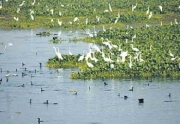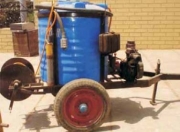/regions/india
India
Misguided debate continues to shape sanitation crisis
Posted on 13 Dec, 2010 12:04 PMA study is now circulating about how more people in India have access to cell phones than latrines. This lit up the blogosphere and Twitter – sector professionals and advocates are both dumbfounded and outraged that something so central to health and development as a toilet is being numerically lapped by something so trivial/consumerist as a cell phone. This affront has led to yet further calls for "action": more money for toilets and greater commitments to sanitation provision from aid agencies, governments, and NGOs who too often prioritize water over sanitation.
Unregulated sand mining threatens Indian rivers - Ground report article
Posted on 11 Dec, 2010 03:47 PMArticle and Image Courtesy: Ground Report
Many in India, perhaps, are not able to foresee how lack of governance, virtually, in every sphere is going to hit them in not too distant future. Take for instance mining. Illegal mining of mineral resources, with generous help of political and bureaucratic big wigs, is so rampant that not only are the country’s precious natural resources being purloined in a big way, its forests are being clean-felled, land degraded and its rivers threatened with extinction.
Water conservation - A viable option to improve water availability - Solution Exchange paper
Posted on 11 Dec, 2010 12:16 PMThis paper from the recommended documentation section of the Solution Exchange for the Water Community Discussion Summary on the preparation of the strategic plan for rural drinking water by the Department of Drinking Water Supply, Ministry of Rural Development, is directed at stakeholders, planners, managers and consumers.
The paper argues on the importance of water conservation in the context of the increasing water shortages that the country has been facing in recent years because of expansion of irrigated areas and rapid industrialisation.
The article argues that water conservation practices need to be encouraged and improved through research, effective regulations, information dissemination and incentives to the end user and more emphasis needs to be placed on adequate coverage, quality monitoring and collection of field level data.
Mitigation and remedy of groundwater arsenic menace in India: A vision document by NIH and CGWB (2010)
Posted on 10 Dec, 2010 11:52 PMThis document, an outcome of the joint efforts of NIH and CGWB gives a detailed outline emphasizing the gaps, focal areas of research, immediate measures to be taken up to provide arsenic safe potable water to the people in the arsenic vulnerable areas, other activities to be initiated for attaining a logical conclusion of the arsenic problem and also to develop a roadmap delineating as to how the suggested activities could be initiated, coordinated, undertaken, including framing out a budget estimate to fulfill those activities.
The Wetlands (Conservation and Management) Rules by Ministry of Environment and Forests (2010)
Posted on 10 Dec, 2010 07:27 AM The Wetlands (Conservation and Management) Rules was notified in December 2010 by the Ministry of Environment and Forests to ensure better conservation and management and to prevent degradation of existing wetlands in India. Wetlands are critical for human development and wellbeing, especially in India where a large number of people are dependent on them for drinking water, food and livelihood. Despite their immense importance, wetlands are one of the most degraded ecosystems globally.
The Wetlands (Conservation and Management) Rules was notified in December 2010 by the Ministry of Environment and Forests to ensure better conservation and management and to prevent degradation of existing wetlands in India. Wetlands are critical for human development and wellbeing, especially in India where a large number of people are dependent on them for drinking water, food and livelihood. Despite their immense importance, wetlands are one of the most degraded ecosystems globally.
Farm Innovators – A compilation by the Indian Council of Agricultural Research (2010)
Posted on 09 Dec, 2010 09:23 PM This publication by ICAR on “Farm Innovators-2010” brings in a paradigm shift towards participatory technology development. Apart from innovations and scientific package of practices developed and transferred from R&D institutes, innovations in the form of grassroot level technologies and methodologies developed by some of the innovative farmers and rural youth have also been accepted across the system.
This publication by ICAR on “Farm Innovators-2010” brings in a paradigm shift towards participatory technology development. Apart from innovations and scientific package of practices developed and transferred from R&D institutes, innovations in the form of grassroot level technologies and methodologies developed by some of the innovative farmers and rural youth have also been accepted across the system.
Community-Led Total Sanitation (CLTS) Newsletter for December 2010 : "82% rural India still lacks basic amenities"
Posted on 09 Dec, 2010 02:02 PMArticle and Image Courtesy: Community Led Total Sanitation (CLTS)
 Community-Led Total Sanitation (CLTS) is an innovative methodology for mobilising communities to completely eliminate open defecation (OD).
Community-Led Total Sanitation (CLTS) is an innovative methodology for mobilising communities to completely eliminate open defecation (OD).
Wildlife Wetlands Photography Contest & Young Environmentalists Programme
Posted on 09 Dec, 2010 10:48 AMWildlife Wetlands Photography Contest by WWF & Young Environmentalists Programme in association with Meluha-The Ferns ecotel, Hiranandani Gardens Powai, Mumbai-400076 on 2nd February 2011.
World Wetlands Day Photography Submissions
A brand new photography international competition is here, the WWF & YEPT in association with Meluha-The Ferns ecotel awards celebrates and recognizes the talents of photographers of all nationalities highlighting the great wealth and diversity of wetlands and wildlife on Planet Earth.
Preparation of a strategic plan for rural drinking water sector - DDWS discussion paper
Posted on 08 Dec, 2010 08:29 PMThis document is a discussion paper for the preparation of the strategic plan for the rural drinking water sector by the Department of Drinking Water and Sanitation (DDWS).
India - Water resources management sector review - World Bank (1998)
Posted on 08 Dec, 2010 05:20 PMThis background report on Rural Water Supply and Sanitation by the World Bank, as a part of the Water Resources Management sector review, dwells on the policy and constraints of this sector, institutional and financial issues related to sector reform process and advocates an approach/plan to bring about radical reforms in the sector.